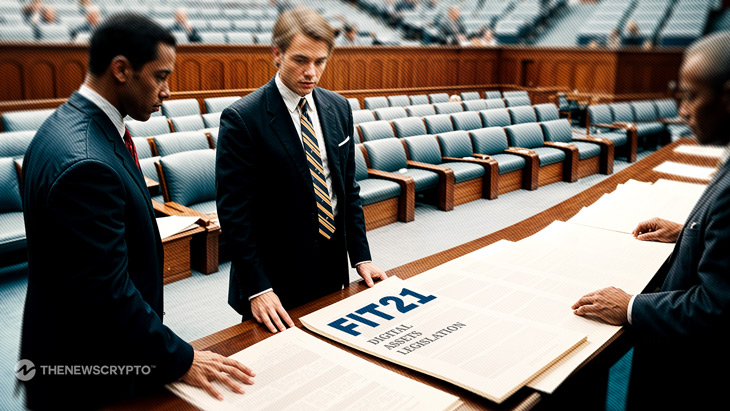- FIT21 Act passed the house: 279-136 vote, 71 Democrats, 208 Republicans.
- The legislation clarifies the SEC and CFTC’s roles in regulating digital assets.
In a historic move, the United States House of Representatives approved H.R.4763, known as the Financial Innovation and Technology for the 21st Century (FIT21) Act, on May 22. The bill, aimed at providing regulatory clarity for digital assets, passed with a significant majority in a 279 to 136 vote. This legislation marks a pivotal moment for the cryptocurrency industry in the U.S.
The FIT21 Act seeks to delineate the regulatory roles of the Securities and Exchange Commission (SEC) and the Commodity Futures Trading Commission (CFTC) concerning digital assets. A bipartisan coalition, including 71 Democrats and 208 Republicans, backed the bill, signaling widespread support across party lines.
Representative Patrick McHenry, a proponent of the bill, argued that the current regulatory framework is hindering innovation in the digital asset sector. “The SEC and the CFTC are currently in a food fight for control of these asset classes,” McHenry stated, emphasizing the need for clear regulations to unlock the full potential of digital assets.
However, the bill faced staunch opposition from notable figures such as Representative Maxine Waters. Waters warned that the FIT21 Act could create a “regulatory no man’s land,” potentially leading to deregulation of crypto and traditional securities. She expressed concerns that the legislation could precipitate a market crash and recession by allowing financial firms to operate without adequate SEC oversight.
What Lies Ahead For FIT21?
Despite President Joe Biden’s opposition to the bill, he has not issued a veto threat. SEC Chair Gary Gensler also voiced strong opposition, arguing that the bill could undermine existing securities regulations.
The passage of FIT21 represents the most significant legislative achievement for the crypto industry in Congress to date. The bill now heads to the Senate, where its future is uncertain due to the absence of a counterpart bill and varying levels of support.
In addition to FIT21, the House is set to discuss H.R. 5403, the Central Bank Digital Currency (CBDC) Anti-Surveillance State Act, which aims to prohibit the Federal Reserve from issuing a digital dollar through intermediaries. Democratic leadership has indicated opposition to both bills but has not actively lobbied against them.
Representative Josh Gottheimer, one of the Democrats supporting the bill, described it as “well-reasoned, thoughtful, bipartisan legislation,” urging for collaborative efforts to make it law.
As the U.S. grapples with lagging behind other nations in crypto regulation, the FIT21 Act’s approval in the House signifies a crucial step toward establishing a structured regulatory environment for digital assets. The Senate’s response will determine the next phase of this legislative effort.
Highlighted Crypto News Today
Goldman Sachs CEO David Solomon Predicts No Fed Rate Cuts in 2024








